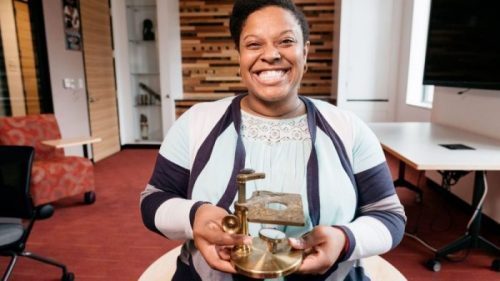Featuring Professor Khadijah Mitchell, Biology
 Today we profile a faculty member who recently started at Lafayette, Dr. Khadijah A. Mitchell. Dr. Mitchell is an assistant professor in the Biology Department, and was hired after her postdoctoral training at the National Cancer Institute and doctoral training at the Johns Hopkins School of Medicine. She is a human geneticist with expertise in health disparities and epigenetics.
Today we profile a faculty member who recently started at Lafayette, Dr. Khadijah A. Mitchell. Dr. Mitchell is an assistant professor in the Biology Department, and was hired after her postdoctoral training at the National Cancer Institute and doctoral training at the Johns Hopkins School of Medicine. She is a human geneticist with expertise in health disparities and epigenetics.
Dr. Mitchell teaches mostly STEM majors in her courses. Her classes include Molecular Genetics and Precision Medicine, which both contain course-based research experiences (CURES), where students engage in an extended laboratory research project as a significant component of the course. When asked what she enjoys most about teaching at Lafayette, she describes both attributes of the students and the opportunity she has to challenge her learners to reach their full potential.
Students at Lafayette are so inquisitive, ambitious, and motivated. When I teach something in the classroom I love that they send me articles or describe their own experiences. I integrate that. I think because we truly have a teacher-scholar model, it allows me to have a healthy research program and be able to use that science in the classroom and laboratory CURES. My favorite part is helping the students generate new knowledge. Lafayette is a great place to push students to a higher level of thinking, and I think that’s welcomed and encouraged.
With regards to her courses, Professor Mitchell discusses the application of concepts as an important aspect.
I think a key component, whether I have a 200-level or a 300-level course, is to talk about science and its intersection with society. I bring in a lot of current topics and how they are applicable to human health in particular, because that is my training and background. The interesting thing about how all my courses work is that at the beginning of the week I start by introducing concepts. We’re at the bottom of the pyramid of Bloom’s Taxonomy so to speak, and at the end of the week, we apply what we’ve learned.
Additionally, Dr. Mitchell builds community in her classroom through the pedagogical methods she employs.
I use an interactive lecture style. So I lecture for about 10 to 15 minutes, then I have either some type of question or activity like Think-Pair-Share. I do that so I don’t just stand up there the whole time. Sometimes when we’re doing problem-based learning questions, I’ll sit in the class and interact with the students. I also welcome students’ questions and feedback, so I create a shared sense of community in the classroom. In the Molecular Genetics class, groups of four work together in “houses” named after famous Lafayette alums that are geneticists. On Friday when we play review games, they answer trivia questions using Kahoot as a house. You really see this camaraderie amongst the houses. So, even within smaller groups they come together.
Dr. Mitchell’s influence extends beyond the classroom and laboratory.
I guess two of the most powerful memories that I have are of students in the Precision Medicine class. I was teaching about genomic profiling techniques and how they can be used in a clinical setting. I asked, ‘How many of you would challenge something that your physician told you to do?’ and none of them raised their hand. I told them they have a voice in their health care along with their provider’s advice, and that’s called shared decision-making. Afterwards, I talked about the importance of this, how you interpret the data, and what does that mean for your health. I was so proud when one of the students came to me at the end of the semester after going for a particular procedure and learned about another option. She said she talked with her physician about what to change based on our class discussion. Second, I had a student say, ‘You changed the way I think. I never thought of that before.’ That is the type of impact I want to make.
Read More About Dr. Khadijah Mitchell
sites.lafayette.edu/mitcheka